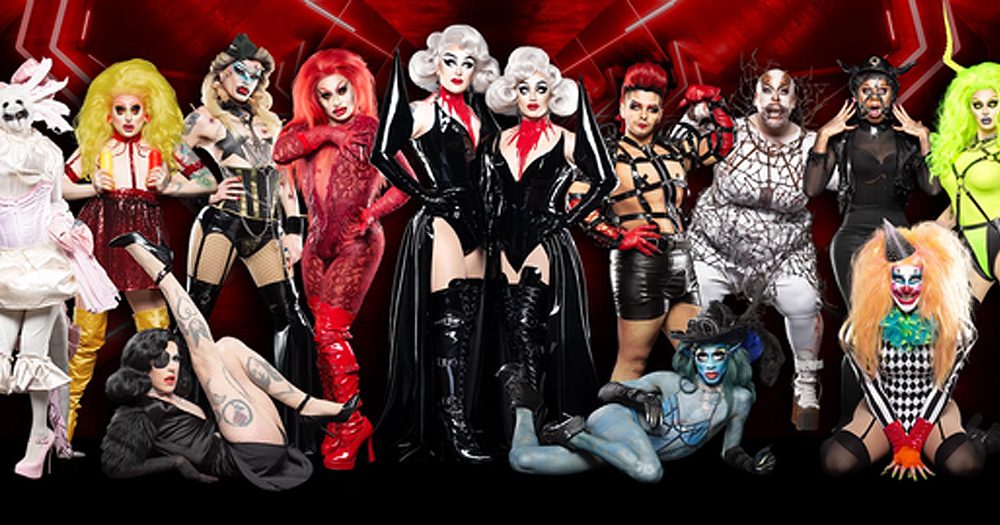Welcome to What’s the Buzz, where members of our staff provide you with recommendations on a weekly basis. This week, Laura Stewart is listening to Modern Rituals, Hawk Ripjaw got around to watching You, Caemeron Crain is digging Jack Cruz and The Flame of Love, Will Johnson recommends Clemency, and Rachel Stewart is watching Dragula.
Modern Rituals, “Them Days Is Gone”
Laura: Bristol-London based 4-piece, Modern Rituals latest single “Them Days Is Gone” sees the band effortlessly flaunt their more melodious tendencies to shimmeringly glorious effect. Trudging rhythms unravel wonderfully from the songs opening into major chord progressions, with tired yet saccharine vocal harmonies peppered throughout, bringing together something that sits between slacker anthem and pop sensibility.
This diversion of sound when stood next to their previous single “The Bull Never Wins” is indicative of the bands multifaceted nature, finding some light amongst the muck. As the latter half of the song sees guitar solos explode and squall out into a final chorus, before returning to a more subdued trudge, it’s unquestionably a difficult task to not find something to love about Modern Rituals’ capricious nature. More than a whiff of early Weezer and Far in these melodies, and that is not a bad thing at all.
The new single is taken from their upcoming new full-length This Is The History available on the 20th of March on Holyroar Records.
https://youtu.be/KDBoqdz_gc0
You
Hawk: I’ve finally boarded the hype train on the Netflix (formerly Lifetime) show You, and I am very glad that I did because it is every bit as entertaining and bingeable as touted.
The show centers on Joe Goldberg (Penn Badgley), a well-read bookstore manager who finds himself obsessed with a beautiful young woman named Beck (Elizabeth Lail). He immediately wants to make sure she is safe. Locating all of her social media accounts and finding out where she lives is the beginning. From there, Joe narrates how they’ll interact when they’re dating. Then he gets access to her phone. And when they actually start dating, it only gets darker and more fun from there.
You has often been referred to as similar to Dexter. This makes sense, because both shows follow inherently bad people with first person narration. While Dexter played with the moral murkiness of “killing, but only bad people,” Dexter acknowledged that he was objectively sick and managed his sickness in the best way he could. Joe, in a clever wrinkle in formula, refuses to accept that he is an obsessive creep and sociopath.
He instead views himself as the ultimate caretaker, even if that means stalking the object of his affection across multiple social media accounts and following her around in real life. And yet, he does care. In both seasons, he befriends young teenagers and takes a genuine interest in their well-being. When his young neighbor is sitting outside his apartment because his mother and her boyfriend are screaming at each other, Joe gives him his just-purchased meatball sub, lying and claiming he forgot about his existing leftovers. He instead has to contend with peanut butter and saltines—which he consumes while obsessively cyber-stalking Beck. Some of his intentions might be good, but the show wastes no time in making it very clear that Joe is not a good person.
Joe infers that nearly everything is somehow about him, makes broad and often self-affirming statements, and frequently backs himself into corners. Often, the show transforms into a comedy of errors in which Joe is on the verge of all of his identity being blown open, but he always escapes through a combination of cunning and serendipity—it is solidly engaging television. Listening to Joe’s meticulous narration and presumptuous pondering that could be either completely accurate or simply paranoia is nail-biting, especially because he is occasionally absolutely right about his suspicions.
It’s tricky to keep a character as unlikeable as Joe interesting, but You pulls it off, mainly through the strength of the writing. It goes to dark, skeevy places, and you may even find yourself looking over your shoulder in case you’ve got a Joe of your own. But it also leans hard into the pulp, with wild twists that stack on each other like a narrative Jenga tower. It’s impressive how it weaves Joe’s development, his pain, and startling character revelations into something that is funny, gripping, and tragic all at the same time. The dialogue is snappy and crackles with a self-aware camp, but has intricate set-up and payoff that really emphasizes this show’s stealth cleverness.
It also dabbles in Joe’s troubled home life that informs his intense separation anxiety, and has secondary characters that are an even mix of surface level caricature and hidden depth. Many of these people are very broken beneath their cliched cultural veneer. The second season in particular makes some surprisingly strong movement with some characters that lends it a dynamic far more textured than a simple stalker thriller. Many of these characters are broken, and the show takes time for them to have their moments.
I don’t think I’ve devoured almost 20 hours of television that quickly in a very long time. You is terrifically engaging from start to finish, and I only have to wait until next year until Season 3. Aw, crap. It’s only January.
Jack Cruz, The Flame of Love
Caemeron: Earlier this week David Lynch gave us all a gift on his birthday with the Netflix release of What Did Jack Do? If you haven’t watched the short film yet, I don’t know what you are doing with your life, but you should certainly go and do that as soon as possible. It features Lynch himself interrogating a monkey named Jack, and it is quite something.
I was pretty sure from the beginning that it was Lynch himself voicing Jack. However, the credits for What Did Jack Do? list Jack Cruz as himself. This is hilarious, and now Lynch is taking that up a notch with the release of an EP from Jack Cruz entitled The Flame of Love, which will be sold in physical form on vinyl in the coming months (you can pre-order now).
The EP features two songs, the first of which is the one that Jack sings in the film: “True Love’s Flame.” As a fan of Lynch’s music, this musical number was when I became certain that it was Lynch providing Jack’s voice, and the effect of the song is certainly more powerful within the context of What Did Jack Do? than it is on its own.
But the interesting thing about The Flame of Love is that it gives “True Love’s Flame” a different sort of context by following it up with “Dancin’ in the World of Love.” We’re led here to imagine Jack as a singer, perhaps with a career, but at least with a record release—and he is!
Sacred Bones describes it thusly:
January 20, 2020 saw the surprise release of David Lynch’s short What did Jack Do? on Netflix. If you watched the grainy, police procedural over the last few days, you most likely found yourself saying aloud “who is Jack Cruz and how can I get more of his music?” Now, just in time for the Grammys, Sacred Bones is announcing the release of the short’s featured original song “True Love’s Flame” by the primate star crooner of yesteryear; Jack Cruz. Not much is known about Cruz’s career prior to his involvement with Lynch, but fortunately, we have not just one song, but two: “Dancin’ in the World of Love” is the B-side to the short’s single…uncovered recently and an excellent example of Cruz’s emotional prowess and magical, gold-dipped vocal cords. Both songs were written by Lynch and Dean Hurley and are available for pre-order in both black and clear vinyl 45s with artwork carefully crafted by Lynch himself.

Clemency
Will: I was lucky enough to see new prison drama Clemency last week upon its nationwide release. As my fellow film critic Don Shanahan mentioned in his review two weeks ago, the depiction of how a lethal injection happens is “a frigid reality”. And indeed, the opening salvo of the film is a botched lethal injection in which we see a criminal inmate (the crime he committed can be assumed but we are never told) suffers immensely before he is, for lack of a better term, put down. It is shocking in its potency and while not entirely visceral, it is certainly uncomfortable.
The (eventually) successful commission of death is Warden Bernadine William’s (Alfre Woodard) 11th execution since taking over the prison and she has successfully managed to remain emotionless throughout each one. So dedicated is she to her job that harmless bending of rules, like offering a death row inmate an extra visitor or allowing an additional viewer of the execution itself is denied without feeling, only reason. It makes her cold and clinical but it gets the job done. But she is aware her soul is in decline. She only comes alive when drunk and her weary husband (Wendell Pierce), as well as any friends she has, are starting to fade away as she continues her insular demolition.
Clemency is a slow burn but one that examines the incremental destruction of self. We care for Bernadine because she is professional and, most importantly for a film, three dimensional, but we see her ability to function outside of her job fade. She becomes, in a sense, a villain but one of her own making. So dedicated is her sense of professional ethics that she won’t grant herself clemency to feel again, let alone continue a marriage, foster meaningful relationships, show tender mercies to suffering family members, or even sleep. She is plagued by the mental prison she has placed herself in.
Thus Clemency works as both a literal prison drama surrounding a potentially innocent man named Anthony Woods (Aldis Hodge) sentenced to death and how Bernadine reacts to it (it being her 12th execution), as well as a psychological prison thriller involving one who oversees death on multiple levels (of those in her care and of herself). The fact that the Academy left out Ms. Woodard and Mr. Hodge for nomination consideration is criminal. Hodge gets the more visceral dramatics as he deals with the final days of his life but Woodard has to embody the emaciation of her insides, something we can’t see but feel. For an actor to project internal feelings is the true test of acting prowess and Woodard delivers it in spades.
Special mention must go to director Chinonye Chukwu, yet another female director who wasn’t even in the discussion for a Best Director Oscar. In just her second feature film, Chukwu successfully extends the concept of prison life outside of the main prison itself, showing the comfortable surroundings of Bernadine’s home as a prison in itself, slowly sucking her dry as her ability to sleep continues to decline. The film is dreary without cinematic tricks like overly dramatic filters or stunt lighting. The weight of reality is heavy on the film and Chukwu’s direction is key to featuring that attribute.
So if you are looking for an impressive character study and don’t mind likely being depressed as all hell for two hours, go to your local theater and support Clemency.
Dragula Takes a Bite Outta RuPaul’s Drag Race
Rachel: Look, no one is debating that RuPaul isn’t the queen of all things drag, but it seems pretty shady that her promos for Season 12 of Drag Race feels more horror-aligned than before and drag queens from both Drag Race and Dragula took notice.
Not familiar with Dragula? Well, here’s the tea, honey. Dragula is a drag competition hosted by the Boulet Brothers. The show focuses on—in their own words—”drag, filth, horror, glamour”–and their queens (and kings) are put to the test in delivering not only runway looks but also completing disgusting challenges if they end up placing low in competition. (These challenges are Fear Factor worthy, too, with contestants eating live spiders, jumping out of planes, you name it. It’s not for the squeamish.)
I started watching Dragula on Netflix at a friend’s suggestion. (Thanks, Hannah.) What I found was a more authentic drag experience. Unlike RuPaul’s Drag Race which thrives (and creates) its own drama, the Boulet Brothers don’t suffer fools or drama and tell the contestants to work their shit out. (I respect that a whole lot.) The queens follow suit and their conversations are more candid and honest and lends itself to a documentary feeling whereas RuPaul’s gig is firmly planted in the reality TV spectrum.That doesn’t mean the Boulet Brothers don’t know their camp references, because their outfits and filmed vignettes often recall some of the greatest moments of horror and camp (think Mommie Dearest and Rocky Horror Picture Show for starters.)
Their mantra before judging is also inspiring: “We are not here to judge your drag. Drag is art and art is subjective. What we are judging you on is your drag as it relates to this competition.” Ru has made some controversial judging calls in her time, and many of her queens have skewed more towards beauty than filth, so it’s interesting to see the Boulet Brothers call drag what it truly is: art. Their show has also stepped up and featured a drag king (the absolutely stunning Landon Cider), something Ru has yet to do. The fact that the new Drag Race previews are darker and feature more horror-inspired queens show that the Boulet Brothers are on to something, so if you’re up for a different sort of drag competition, Dragula is a scream and well worth your time.

Those are our recommendations this week! What are yours? Let us know in the comments!




